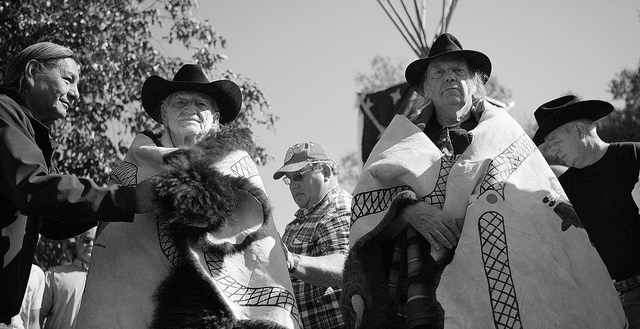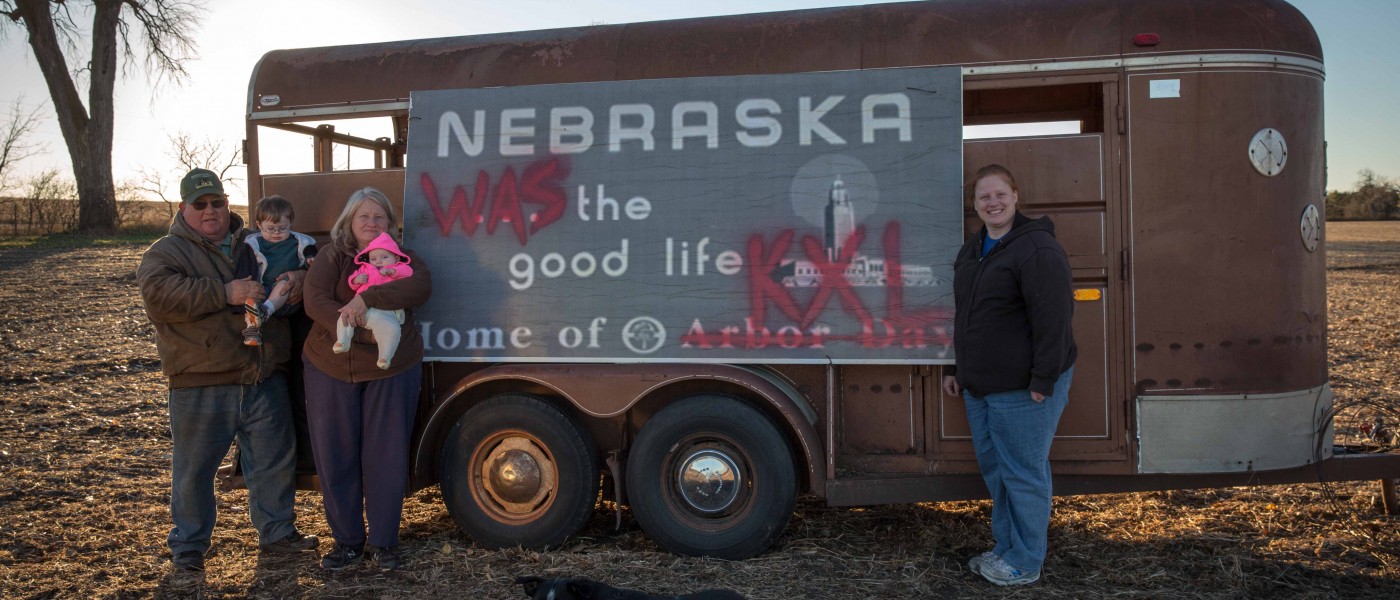Art Tanderup, Farmer and Pipeline Fighter
Helen and Art Tanderup grow corn, soy and rye on 160 acres in Neligh, NE. Their farm is in the environmentally fragile Sandhills region and above the crucially important Ogallala Aquifer. The farm has been in Helen’s family for more than 100 years. For more than eight years, Art and Helen have been fighting to protect it.
In 2014, Farm Aid named Art a Farmer Hero for his fight to keep TransCanada’s Keystone XL Pipeline from coming through the farm. Like other Nebraska landowners, the Tanderups refused to sell their land or submit to eminent domain for private gain by a foreign corporation. The Tanderups joined three other landowners and took their fight all the way to the Nebraska Supreme Court, where they were dealt a loss. They continued to fight the taking of their land by eminent domain in later court proceedings. And luckily the Obama Administration stepped in at the federal level to find that building the pipeline was not in the national interest of the United States.
A Battle Won, Then Begun Again
In 2015, we joined Art to celebrate the defeat of the pipeline when the State Department rejected the permit. In 2017, when President Trump reversed that decision and approved the pipeline, our hearts broke for the Tanderups and everyone fighting for their land, soil and water. The future of their land is once again unknown, but one thing is clear, Art and the pipeline fighters are not giving up. “We’re going to do everything we can to persuade them to do the right thing,” Art proclaims.
While President Trump fulfilled his campaign promise to approve the Keystone XL Pipeline, TransCanada does not yet have a permit to construct it in Nebraska. In other words, Nebraska is the final hurdle for TransCanada, and Art and his fellow pipeline fighters are making their last stand. The fate of the pipeline now lies in the hand of the Nebraska Public Service Commission, which will hold just two public hearings to inform their decision. During August 7-11, the Commission will also hear from more than 200 “intervenors,” people or groups that have applied for legal status in the permit process. The intervenors include 90 landowners, in addition to the Ponca Tribe of Nebraska, the Yankton Sioux Tribe, concerned citizens, and organizations like Bold Nebraska, of which Art and Helen are members.
Hope, Determination, Unity
As Art sees it, there are three possible outcomes: (1) The pipeline is denied entry to Nebraska; (2) TransCanada’s preferred route (traveling through Art’s property, through the Sandhills and above the Ogallala Aquifer) is approved; or (3) TransCanada is forced to reroute the pipeline, likely following the route of the existing Keystone I pipeline. Art feels it is likely that the provision that the Public Service Commission must consider the aquifer means that option 3 is most likely. But, he says, “Those tar sands need to stay in the ground. This is not just a ‘not in my backyard’ issue. This is about the fact that we don’t need this pipeline and we don’t need to set ourselves back in climate history.”
Art is passionate about the natural resources of his home state. He says, “We have to protect the aquifer… it’s our future.” In fact, agriculture in the Midwest relies on the Ogallala. A spill would put the livelihoods of farmers and ranchers at grave risk and threaten the drinking water of millions of Americans. Art worries that despite this, “Nebraska is bound and determined to build this thing.”
The pipeline fighters are equally bound and determined to protect their land, soil, water, traditions and culture. The coalition of farmers, ranchers, landowners, Native American tribes, environmental organizations and climate change activists remains united. In fact, Art suggests they may be stronger than ever following the pipeline fight at Standing Rock in North Dakota. “Standing Rock had to shut down, but all the people who were there put a sacred fire in their hearts, and they are taking it everywhere they go,” he says.
To once again seal their partnership to fight the pipeline together, farmers, ranchers and Native Americans will plant sacred corn on land on Art and Helen’s farm in May. In the meantime, Art will be busy planting his own corn and soy. He’s currently assessing his rye crop because, “With climate change and a warm winter, we had some winter kill.” For farmers, the signs of climate change are all around, making this fight even more important.
When asked how it feels to wage this battle again, Art says, “We have to keep our spirits up, but I worry for my grandkids. We are removing rules and regulations that protect us and our natural resources without thinking of the consequences.” Reflecting his seemingly boundless optimism, and his experience as an educator, Art then says there are positive aspects of this experience.
“We have been educating so many people. We are planting the seeds of resistance.”
To learn more about the fight for climate justice in Nebraska, and how you can help, visit Bold Nebraska.

Willie Nelson and Neil Young attended and performed at Harvest the Hope, a protest in Nebraska against the Keystone XL Pipeline. Willie and Neil were honored by the Rosebud, Oglala, Ponca and Omaha Nations for their dedication to family farmers, ranchers and native families. This spring, a tree will be planted in the path of the pipeline in each of their names. Pictured (from L to R): Russel Eagle Bear, Willie Nelson, Art Tanderup, Neil Young, and rancher Randy Thompson. Photo credit: Arto Saari/Bold Nebraska





